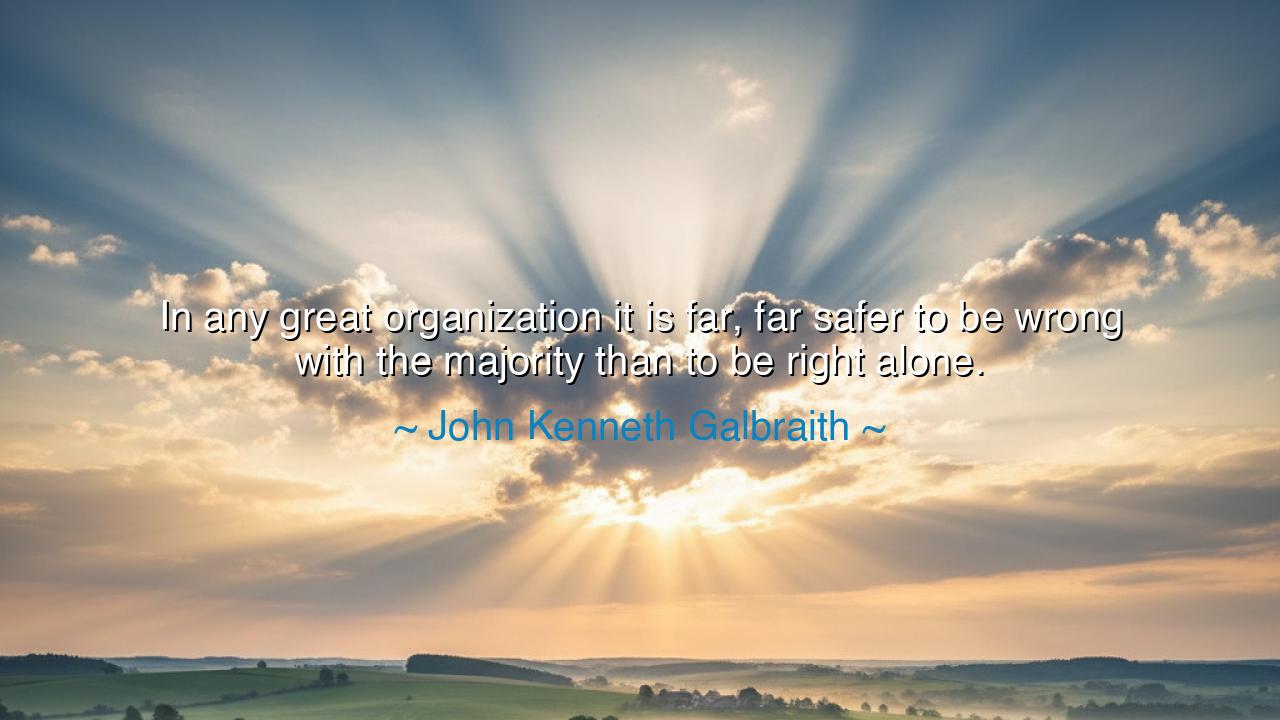
In any great organization it is far, far safer to be wrong with
In any great organization it is far, far safer to be wrong with the majority than to be right alone.






“In any great organization it is far, far safer to be wrong with the majority than to be right alone.” — John Kenneth Galbraith
In these penetrating words, John Kenneth Galbraith, the economist and statesman of piercing intellect, unmasks one of the most ancient truths about power, conformity, and courage. He reveals that within the walls of great institutions—whether they be governments, corporations, or empires—it is often safer to conform to error than to stand in the perilous light of truth. To be “right alone,” he warns, is not rewarded but punished. His words strike at the heart of the eternal struggle between conscience and comfort, between the wisdom of the individual and the blindness of the crowd.
The origin of this quote can be traced to Galbraith’s observations of political and bureaucratic life, especially during his years as an advisor in the U.S. government and as ambassador to India. He saw firsthand how institutions, built for stability, fear dissent, and how those who question the collective course are branded as troublemakers. Galbraith’s wisdom was born not in theory alone but through the weary eyes of experience. He watched policies fail not because the truth was hidden, but because no one dared to speak it. For to stand against the majority, especially in times of crisis, is to risk isolation—and in the realm of power, isolation is exile.
This truth echoes through the corridors of history. Consider the example of Galileo Galilei, who, standing alone, dared to proclaim that the Earth moves around the Sun. The majority—the Church, the scholars, the kings—declared him wrong. Yet time would prove that his solitude was not ignorance but vision. Galileo was right alone, and for that rightness, he suffered confinement and scorn. So too did Socrates, who, in ancient Athens, was condemned for corrupting the youth simply because he taught them to question. To stand alone in truth has always been a dangerous act. The majority, though loud and confident, often serves comfort before truth and pride before wisdom.
Galbraith’s words, then, are not merely a lament—they are a warning. They remind us that the structure of safety within large organizations is an illusion. The crowd may protect you from blame, but it cannot shield you from consequence. When all walk in the same mistaken direction, they fall together. The one who walks alone toward truth may stumble, but he does not perish. History vindicates the solitary thinker long after the chorus of the crowd has faded. Yet in the present moment, the courage to be right alone is the rarest and most demanding of virtues.
And yet, Galbraith’s observation also carries compassion. He does not condemn the majority, but understands the human fear of exile. To oppose one’s peers, to risk ridicule and isolation, is no small thing. It is easier—far easier—to blend into the collective will. But he reminds us that true greatness, whether in governance, science, or the soul, has always belonged to those who chose truth over safety. The prophets, the reformers, the innovators—all bore the burden of being right before their time. The world mocks them first, then builds monuments in their honor.
This wisdom applies not only to nations and corporations but to our own lives. In every community, family, or workplace, there comes a moment when we must choose: to go along for peace, or to stand apart for principle. The temptation to align with the majority, even when it leads astray, whispers comfort to the weary heart. Yet Galbraith teaches that integrity is a higher shield than approval. The price of being “right alone” may be solitude, but the reward is peace of conscience—and, in time, the respect of history.
So, O seeker of truth, let this lesson be carved upon your heart: courage is rarer than intelligence. To think clearly is not enough; one must dare to act upon what one knows, even when others will not. When you find yourself surrounded by the comfort of agreement, ask whether that agreement is born of truth or fear. Be gentle in dissent but steadfast in conviction. For though it may be “safer to be wrong with the majority,” safety is a fleeting prize, while truth endures forever. And when the dust of time settles, it is not the multitude that history remembers—but the one soul who, though alone, stood unshaken in the light of what is right.






AAdministratorAdministrator
Welcome, honored guests. Please leave a comment, we will respond soon